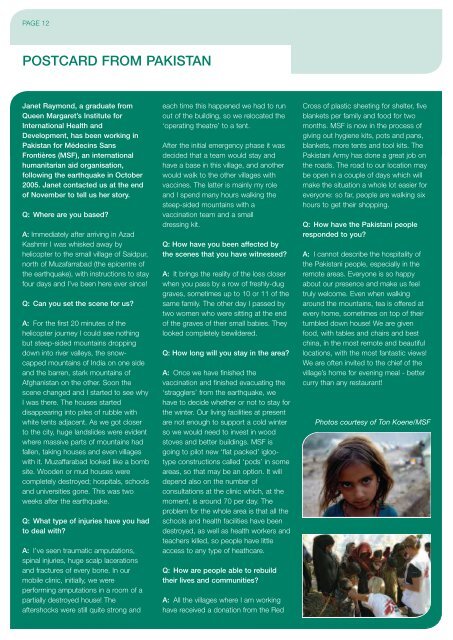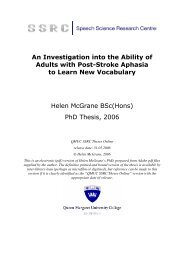QM News 63 (pdf 752KB) - Queen Margaret University
QM News 63 (pdf 752KB) - Queen Margaret University
QM News 63 (pdf 752KB) - Queen Margaret University
Create successful ePaper yourself
Turn your PDF publications into a flip-book with our unique Google optimized e-Paper software.
PAGE 12<br />
POSTCARD FROM PAKISTAN<br />
Janet Raymond, a graduate from<br />
<strong>Queen</strong> <strong>Margaret</strong>’s Institute for<br />
International Health and<br />
Development, has been working in<br />
Pakistan for Médecins Sans<br />
Frontières (MSF), an international<br />
humanitarian aid organisation,<br />
following the earthquake in October<br />
2005. Janet contacted us at the end<br />
of November to tell us her story.<br />
Q: Where are you based?<br />
A: Immediately after arriving in Azad<br />
Kashmir I was whisked away by<br />
helicopter to the small village of Saidpur,<br />
north of Muzafarrabad (the epicentre of<br />
the earthquake), with instructions to stay<br />
four days and I’ve been here ever since!<br />
Q: Can you set the scene for us?<br />
A: For the first 20 minutes of the<br />
helicopter journey I could see nothing<br />
but steep-sided mountains dropping<br />
down into river valleys, the snowcapped<br />
mountains of India on one side<br />
and the barren, stark mountains of<br />
Afghanistan on the other. Soon the<br />
scene changed and I started to see why<br />
I was there. The houses started<br />
disappearing into piles of rubble with<br />
white tents adjacent. As we got closer<br />
to the city, huge landslides were evident<br />
where massive parts of mountains had<br />
fallen, taking houses and even villages<br />
with it. Muzaffarabad looked like a bomb<br />
site. Wooden or mud houses were<br />
completely destroyed; hospitals, schools<br />
and universities gone. This was two<br />
weeks after the earthquake.<br />
Q: What type of injuries have you had<br />
to deal with?<br />
A: I’ve seen traumatic amputations,<br />
spinal injuries, huge scalp lacerations<br />
and fractures of every bone. In our<br />
mobile clinic, initially, we were<br />
performing amputations in a room of a<br />
partially destroyed house! The<br />
aftershocks were still quite strong and<br />
each time this happened we had to run<br />
out of the building, so we relocated the<br />
‘operating theatre’ to a tent.<br />
After the initial emergency phase it was<br />
decided that a team would stay and<br />
have a base in this village, and another<br />
would walk to the other villages with<br />
vaccines. The latter is mainly my role<br />
and I spend many hours walking the<br />
steep-sided mountains with a<br />
vaccination team and a small<br />
dressing kit.<br />
Q: How have you been affected by<br />
the scenes that you have witnessed?<br />
A: It brings the reality of the loss closer<br />
when you pass by a row of freshly-dug<br />
graves, sometimes up to 10 or 11 of the<br />
same family. The other day I passed by<br />
two women who were sitting at the end<br />
of the graves of their small babies. They<br />
looked completely bewildered.<br />
Q: How long will you stay in the area?<br />
A: Once we have finished the<br />
vaccination and finished evacuating the<br />
‘stragglers’ from the earthquake, we<br />
have to decide whether or not to stay for<br />
the winter. Our living facilities at present<br />
are not enough to support a cold winter<br />
so we would need to invest in wood<br />
stoves and better buildings. MSF is<br />
going to pilot new ‘flat packed’ iglootype<br />
constructions called ‘pods’ in some<br />
areas, so that may be an option. It will<br />
depend also on the number of<br />
consultations at the clinic which, at the<br />
moment, is around 70 per day. The<br />
problem for the whole area is that all the<br />
schools and health facilities have been<br />
destroyed, as well as health workers and<br />
teachers killed, so people have little<br />
access to any type of heathcare.<br />
Q: How are people able to rebuild<br />
their lives and communities?<br />
A: All the villages where I am working<br />
have received a donation from the Red<br />
Cross of plastic sheeting for shelter, five<br />
blankets per family and food for two<br />
months. MSF is now in the process of<br />
giving out hygiene kits, pots and pans,<br />
blankets, more tents and tool kits. The<br />
Pakistani Army has done a great job on<br />
the roads. The road to our location may<br />
be open in a couple of days which will<br />
make the situation a whole lot easier for<br />
everyone: so far, people are walking six<br />
hours to get their shopping.<br />
Q: How have the Pakistani people<br />
responded to you?<br />
A: I cannot describe the hospitality of<br />
the Pakistani people, especially in the<br />
remote areas. Everyone is so happy<br />
about our presence and make us feel<br />
truly welcome. Even when walking<br />
around the mountains, tea is offered at<br />
every home, sometimes on top of their<br />
tumbled down house! We are given<br />
food, with tables and chairs and best<br />
china, in the most remote and beautiful<br />
locations, with the most fantastic views!<br />
We are often invited to the chief of the<br />
village’s home for evening meal - better<br />
curry than any restaurant!<br />
Photos courtesy of Ton Koene/MSF

















